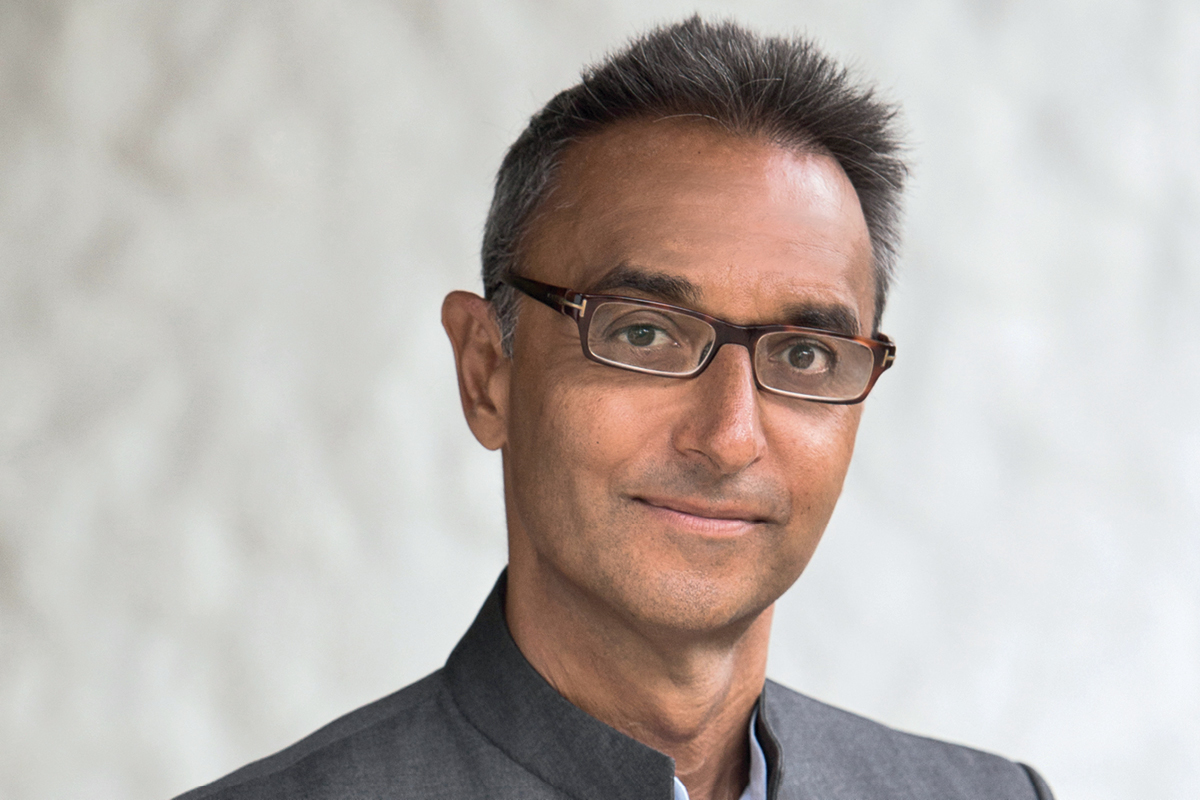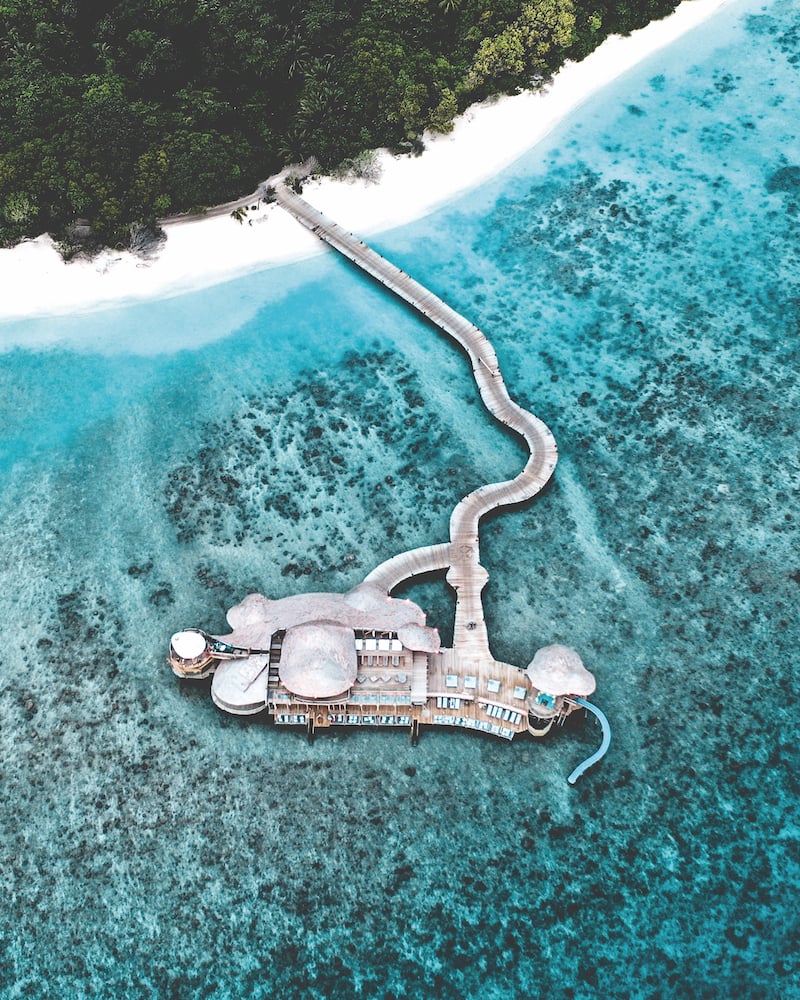Water crystal clear and a blue like nowhere else; a way of life stripped of artifice; sunbaked beaches most days of the year – it’s no wonder Sonu Shivdasani and his wife Eva turned their lives upside down when they first visited the Maldives in the late 1980s.

A graduate of Eton and Oxford, Sonu had big plans for the future, but he and fashion model Eva were so spellbound by this tropical paradise setting they leased one of its small islands and dreamed of building a resort unlike any other. After innumerable obstacles, it finally came to fruition in 1995; they called it Soneva Fushi (from Sonu and Eva) and have never looked back.
“We absolutely loved the Maldives,” says Sonu of their personal discovery. “I had never seen anything quite like it. Eva fell in love with the untouched beauty of the simple way of life in the Maldives. We decided that we would like to open a resort like no other here. We both also had an overwhelming desire to protect the environment. We held – and still hold – a belief that a company must have a clear purpose beyond making money. It must serve and contribute to the society in which it operates and it should not impact negatively on the environment in which it operates.”
So Soneva Fushi was born, and has since been joined by Soneva Jani. They are quite unlike other resorts around the world (except for perhaps their Soneva Kiri resort in Thailand), with a taste for unfiltered luxury underlined by an almost forensic analysis of each resort’s environmental footprint.
This philosophy coalesces with Sonu and Eva’s concept of “intelligent luxury” combined with environmental honesty, on which they based their Six Senses group of luxury resorts in 1995, pioneering wellness, true environmental sustainability and community engagement.
Their concept proved to be very popular – and successful – but Sonu and Eva eventually sold Six Senses in 2012 to concentrate on their ultra-luxury Soneva resorts in the Maldives and elsewhere.
In the pursuit of complete environmental honesty, in 2016 Soneva developed its Total Impact Assessment Report, which analyses all the social and environmental impacts of each resort in its community.
Soneva’s Total Impact for 2018 was almost US$52 million net positive, a 12% increase from the previous year. This tool allows the company to review the direct effect their resorts have on the environment, as well as the indirect impact of their supply chain and air travel for guests, positioning them to make better decisions, efficiently allocate resources and influence the business decisions of suppliers.

During the construction of Soneva Fushi, they refused to use rainforest or unsustainable wood, instead using bamboo, coconut and recycled wood. In doing so, they began the back-to-nature, barefoot luxury trend that has gained popularity globally over the past two decades.
“Slow life is our core purpose. Through this and our guiding principle of ‘Inspiring a lifetime of rare experiences’, we create experiences in which luxury, sustainability and wellness complement each other,” says Sonu.
“So intelligent luxury is what guests can expect. The definition of luxury is something that is a rarity, and in today’s society that is peace, time and space. Luxury is about sand between the toes and dinner under the canopy of a billion stars. Luxury is about reconnecting with oneself and the natural environment.”
Sonu and Eva are hands-on business owners, with meticulous care taken to ensure their long-established goals are maintained and nurtured.
They are also not beholden to other interests, keeping their original vision intact. “Since 2012 our strategy has been to only operate hotels that we also own. To manage the level and quality of our brand properly, we pay an extraordinary amount of attention to detail, not least because we want to maintain our dedication to our sustainability goals,” Sonu points out.
“I am proud that Soneva is known as the original barefoot and sustainable luxury destination.”
“We believe in bringing out the beauty of nature, and this sets us apart. Intelligent luxury is about combining the traditional opposites of sustainability and wellness with luxury. We believe that these things actually complement each other.”
Sonu and Eva have plans to take their unique concept to new horizons, with further expansion to other parts of the world in the next few years.
He believes that a successful business combines apparent contrasts and makes these opposites compatible. Sonu and Eva have so far lived up to those expectations with Soneva’s present resorts, and is adamant that their future ambitions will do the same.
“When this is achieved, it creates such an experience that is both unique and admired that one immediately develops a very strong level of loyalty from guests,” he says.
“The industry is yearning for authentic experiences. With climate change and its effects so apparent, the world is striving for real experiences. Living in the moment is everything. To do that, you need to experience.”
“Living in the moment is everything. To do that, you need to experience.”
Soneva is presently celebrating its 25th anniversary – slowly – and taking great pride in the fact that a simple idea on a beach has morphed into a grand business that not only fulfils its owners’ dreams but also creates the inspiration for the dreams of so many others when they take time out at a Soneva resort.
“I am proud that Soneva is known as the original barefoot and sustainable luxury destination, and for our ability to combine great luxuries but in a sustainable manner,” declares Sonu.
“The Soneva quest isn’t about resting on the company’s laurels; it’s about striving for the only breed of hospitality befitting of our precious planet – perfection.’


